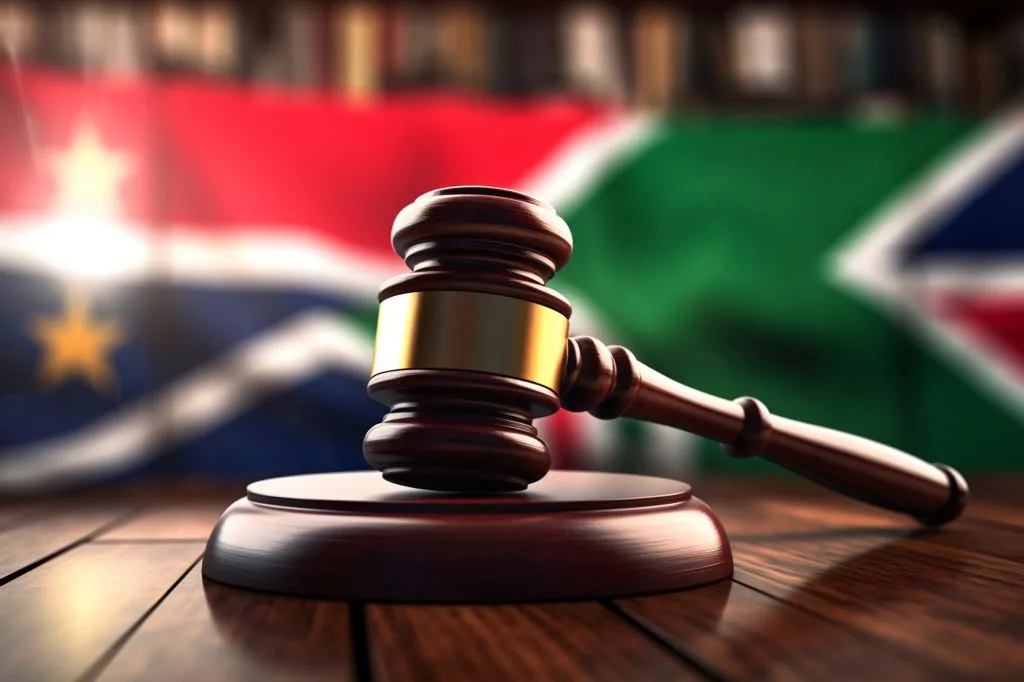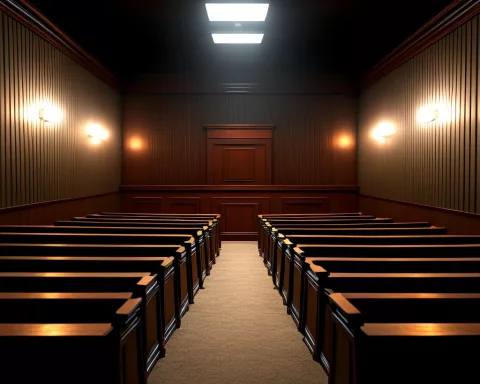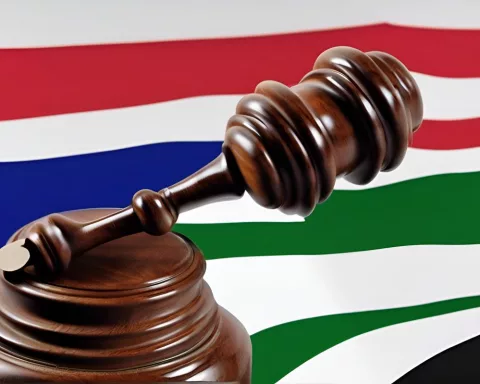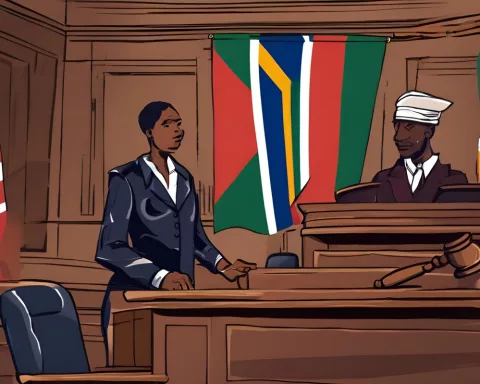The Senzo Meyiwa murder trial is a complex legal drama unfolding in South Africa. Five defendants are facing charges such as premeditated murder, attempted murder, robbery with aggravated circumstances, unlicensed possession of firearms, and possession of ammunition. The trial has resumed under Judge Ratha Mokgoatlheng, with the admissibility of Bongani Ntanzi’s alleged confession being a critical issue. In a landmark decision, the judge ruled the audio recording inadmissible, highlighting the importance of upholding constitutional principles in the pursuit of justice. The trial serves as a testament to the vital role of due process and an impartial judicial system in achieving truth and accountability.
What are the charges against the defendants in the Senzo Meyiwa murder trial?
The defendants, Muzikawukhulelwa Sibiya, Bongani Ntanzi, Mthobisi Prince Mncube, Mthokoziseni Maphisa, and Fisokuhle Nkani Ntuli, are facing charges such as premeditated murder, attempted murder, robbery with aggravated circumstances, unlicensed possession of firearms, and possession of ammunition in the Senzo Meyiwa murder trial. All five individuals have pleaded not guilty to the charges against them.
The Trial Commences: Charges and Contentions
The Senzo Meyiwa murder trial has piqued the interest of South Africans, revealing a complicated series of events and legal nuances. This article delves into the latest developments in the case, offering an overview of the trial and the significant decision about the admissibility of Bongani Ntanzi’s purported confession, one of the five individuals on trial.
Soccer star Senzo Meyiwa met a tragic end in 2014. Since then, the case has been enshrouded in secrecy and fascination, with the trial taking place at the Gauteng High Court in Pretoria. The five defendants – Muzikawukhulelwa Sibiya, Bongani Ntanzi, Mthobisi Prince Mncube, Mthokoziseni Maphisa, and Fisokuhle Nkani Ntuli – are facing numerous charges, such as premeditated murder, attempted murder, robbery with aggravated circumstances, unlicensed possession of firearms, and possession of ammunition.
All five individuals have pleaded not guilty to the charges against them, and the trial has resumed under Judge Ratha Mokgoatlheng. As the case moves forward, both the State and defense’s legal teams passionately argue their sides, striving to uncover the truth and achieve justice.
The Disputed Confession: Legal Battles and Rulings
A critical issue in the trial concerns Bongani Ntanzi’s alleged confession, known as “Accused 2.” Magistrate Vivienne Cronje recorded this confession on June 24, 2020, with Ntanzi’s lawyer and an interpreter present. Intriguingly, Cronje testified that the recording took place without the knowledge of the other parties involved.
At first, the State announced that it would not use the recording. However, they later reversed their position, advocating for the inclusion of the recording as evidence in a trial-within-a-trial that examines the legality of the confessions made by Muzikawukhulelwa Sibiya (Accused 1) and Bongani Ntanzi.
State Prosecutor Advocate George Baloyi argues that the recording is crucial, relying on the best evidence principle to support his claim. On the other hand, the defense contends that Ntanzi’s rights were violated, claiming that he should have been informed about the recording and its potential use against him in court.
In a landmark decision, Judge Mokgoatlheng deemed the audio recording inadmissible, asserting that admitting the recording as evidence would be unjust due to the infringement on Ntanzi’s rights. He further stressed that allowing the recording would result in an unfair trial for Ntanzi and could potentially damage the administration of justice.
Judge Mokgoatlheng declared, “This court rules that the audio recording should not form part of these proceedings; it is inadmissible,” emphasizing the need to uphold the principles enshrined in the Constitution.
Looking Ahead: The Trial’s Progress and Importance
As the trial unfolds, observers cannot help but be captivated by the developing narrative, witnessing the quest for justice for Senzo Meyiwa. The legal tactics, the vivid testimonies, and the profound emotions elicited by the case create a sense of anticipation for the final verdict.
The Senzo Meyiwa murder trial weaves a complex web of events, serving as a testament to the importance of due process and the need for an impartial judicial system. Additionally, the trial highlights the essential role of the media in shedding light on the subtleties of the legal process, allowing the public to participate in informed discussions.
In the midst of this gripping legal drama, one central truth remains paramount: the pursuit of justice in the Senzo Meyiwa murder trial will undoubtedly persist, and the relentless efforts of those involved in the case symbolize truth and accountability in the South African judicial system.
What is the Senzo Meyiwa murder trial?
The Senzo Meyiwa murder trial is a legal case in South Africa involving five defendants who are facing charges such as premeditated murder, attempted murder, robbery with aggravated circumstances, unlicensed possession of firearms, and possession of ammunition. The trial centers around the murder of soccer star Senzo Meyiwa in 2014.
Who are the defendants in the Senzo Meyiwa murder trial?
The five defendants in the Senzo Meyiwa murder trial are Muzikawukhulelwa Sibiya, Bongani Ntanzi, Mthobisi Prince Mncube, Mthokoziseni Maphisa, and Fisokuhle Nkani Ntuli.
What are the charges against the defendants in the Senzo Meyiwa murder trial?
The defendants in the Senzo Meyiwa murder trial are facing charges such as premeditated murder, attempted murder, robbery with aggravated circumstances, unlicensed possession of firearms, and possession of ammunition.
What is the admissibility of Bongani Ntanzi’s alleged confession in the trial?
The admissibility of Bongani Ntanzi’s alleged confession is a critical issue in the Senzo Meyiwa murder trial. The recording was ruled inadmissible by Judge Ratha Mokgoatlheng due to the infringement on Ntanzi’s rights.
Who is Judge Ratha Mokgoatlheng?
Judge Ratha Mokgoatlheng is presiding over the Senzo Meyiwa murder trial in the Gauteng High Court in Pretoria.
What is the significance of upholding constitutional principles in the pursuit of justice?
Upholding constitutional principles is essential in the pursuit of justice, as demonstrated by the ruling that the audio recording of Bongani Ntanzi’s alleged confession was inadmissible due to the infringement on his rights.
Why is due process important in the Senzo Meyiwa murder trial?
Due process is crucial in the Senzo Meyiwa murder trial to ensure that all parties involved receive a fair and impartial trial.
What is the role of the media in the Senzo Meyiwa murder trial?
The media plays a vital role in the Senzo Meyiwa murder trial by shedding light on the legal process and allowing the public to participate in informed discussions.












